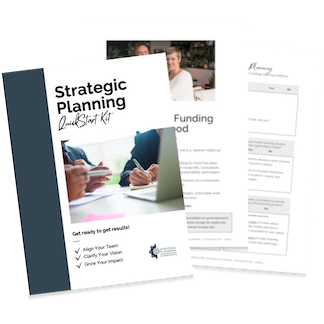Congratulations, you’re launching a new nonprofit organization or taking an established nonprofit to a new level of impact! You’ve got an inspiring vision, committed people, and excellent ideas about how to achieve your goals. So, why do you need a strategic planning consultant?
Forbes recently delved into 14 things first-time founders often forget to include in their business plans. Whether it’s scenario planning or succession planning, any nonprofit leader could get tripped up by these elements. At Funding for Good, we’ve seen it happen time and again.
That’s where a strategic planning facilitator comes in.
Business planning generally involves one or more working sessions with your organization’s key stakeholders. Along with the founder and/or Executive Director, this could include a nonprofit’s Board of Directors, leadership team, and other staff. A facilitator’s role is to not only guide your organization’s leadership toward developing a business plan, but to create critical space for your team to step back and uncover areas they might be overlooking.
A good facilitator:
- Brings a wealth of knowledge and outside experience. Funding for Good often gets requests from nonprofits for a strategic plan template. But the reality is that, when it comes to business planning, one size does not fit all. Yes, there are key questions you’ll need to consider—such as what are your nonprofit’s goals and objectives—but a good facilitator brings more than a list of questions. They come with a wealth of experience, which often includes not just facilitation skills but familiarity with the challenges nonprofits of different sizes, growth stages, and sectors may experience.
- Helps you tackle hard questions. With their wealth of knowledge, a facilitator helps you identify gaps in thinking. This includes tackling the hard questions, particularly those that often slip through the cracks. For example, what are your nonprofit’s current strengths and weaknesses, and what changes—such as losing a major funder—are you prepared to weather? As your nonprofit scales its programming, are you also investing in your internal infrastructure to support that growth? And, maybe one of the most challenging topics for a founder or Executive Director: succession planning. How is your organization preparing for your Executive Director’s future absence, whether that’s an unexpected leave, planned retirement, or simply moving on to the next challenge?
- Creates space for unexpected insights. In order to help your organization tackle hard questions, a skilled facilitator also observes the energy in the room and artfully channels that energy into a rich discussion that ultimately leads to a strong strategic plan. The facilitator is constantly working to create an inclusive and safe atmosphere, ensuring full participation so that your team can gain even more insights. Whether that’s giving Board members the space to ask about checks and balances during your plan’s implementation or providing the opportunity for staff to share observations and questions about organizational culture. Such unexpected insights can be invaluable.
At the end of the day, a good facilitator can guide your nonprofit’s leadership to create a business plan that takes your great ideas and turns them into a roadmap for action that your whole team is invested in implementing.


